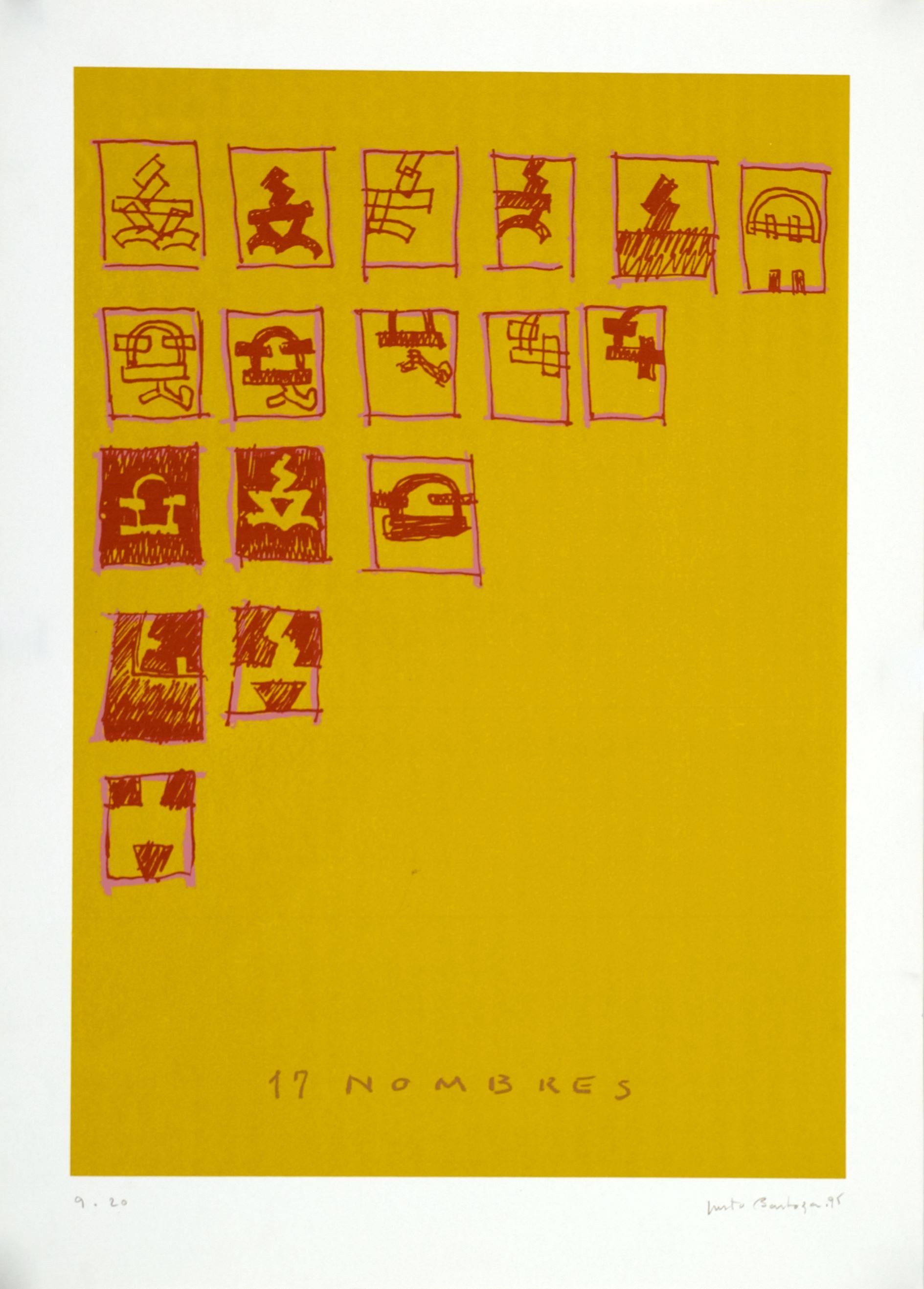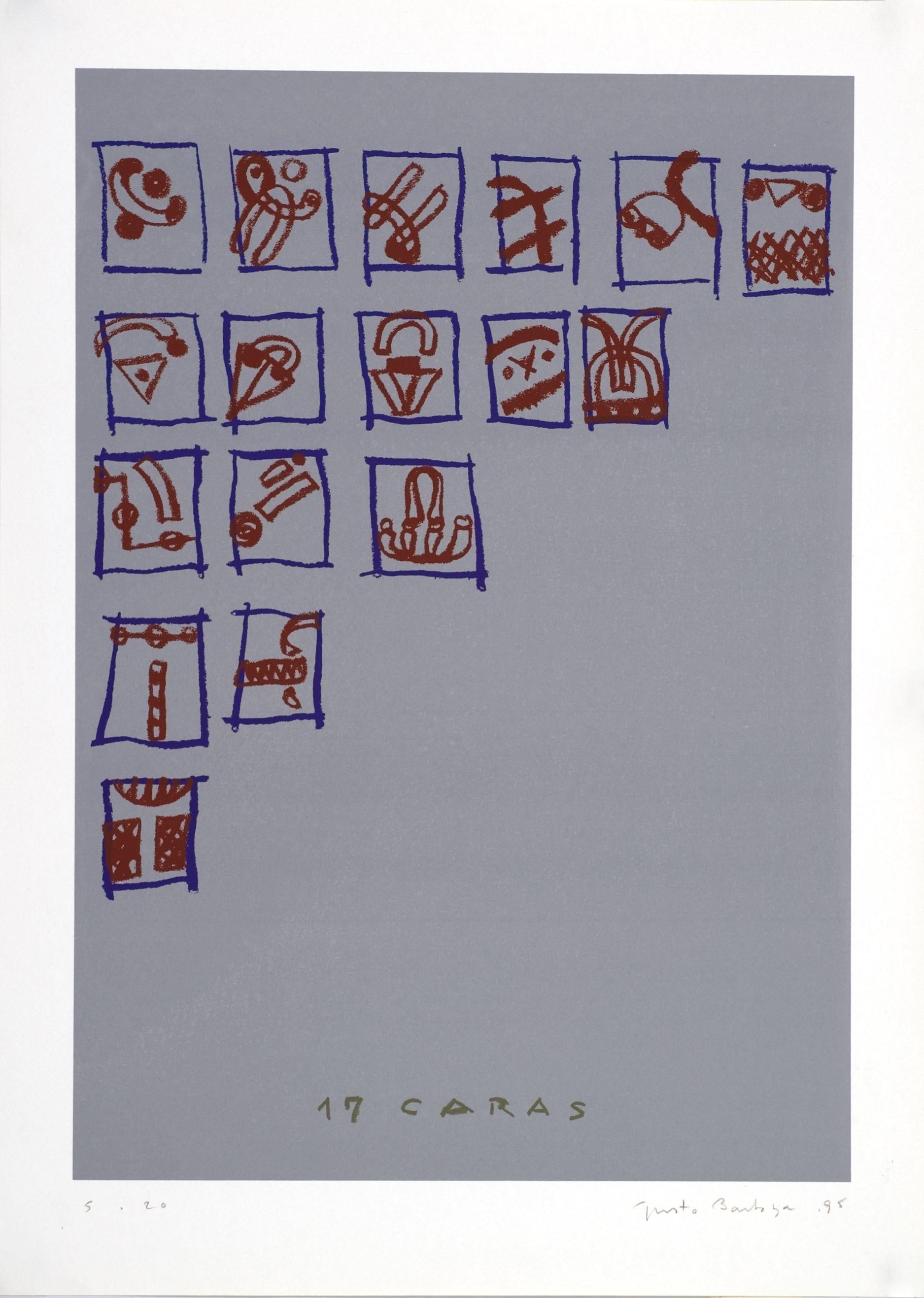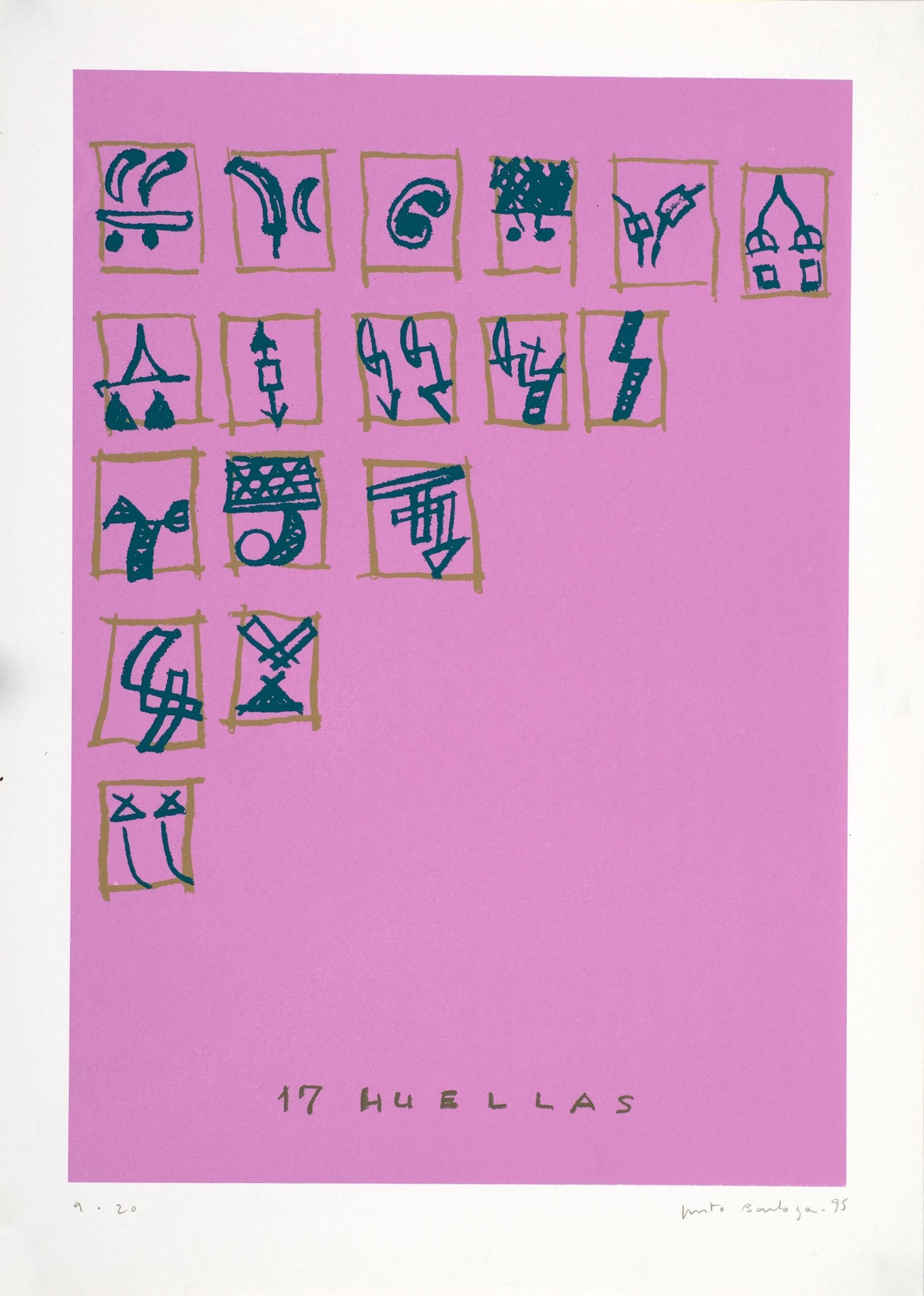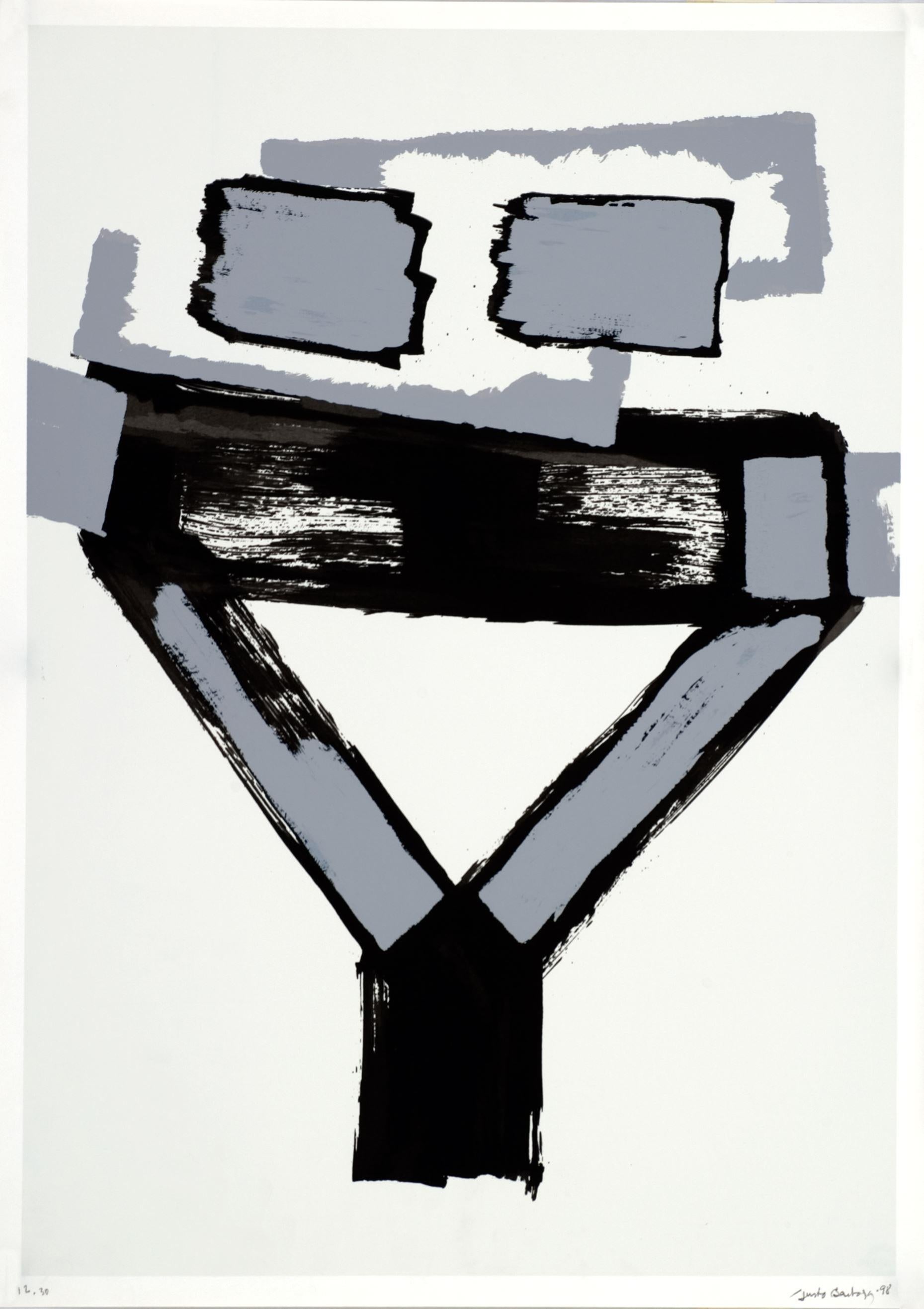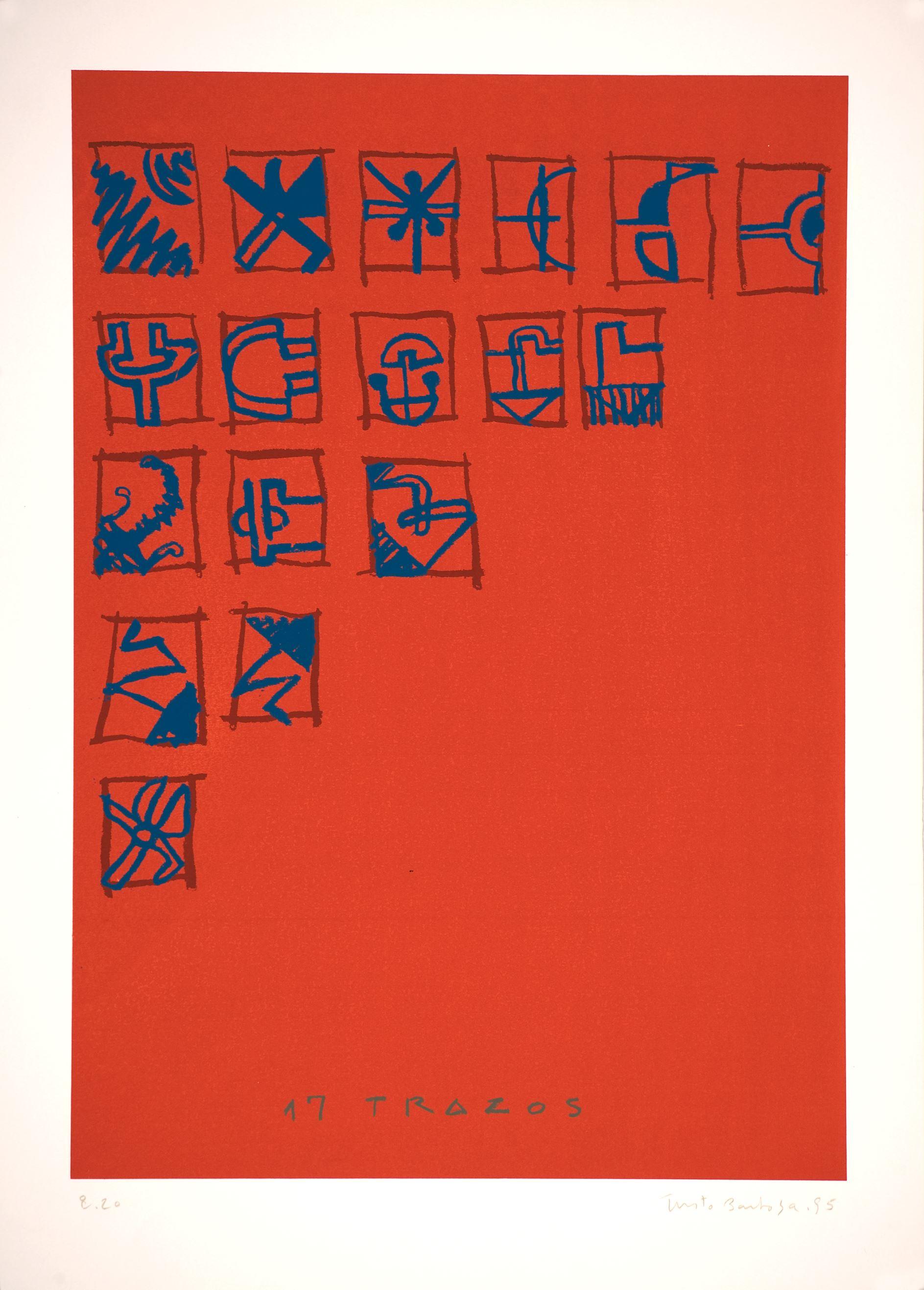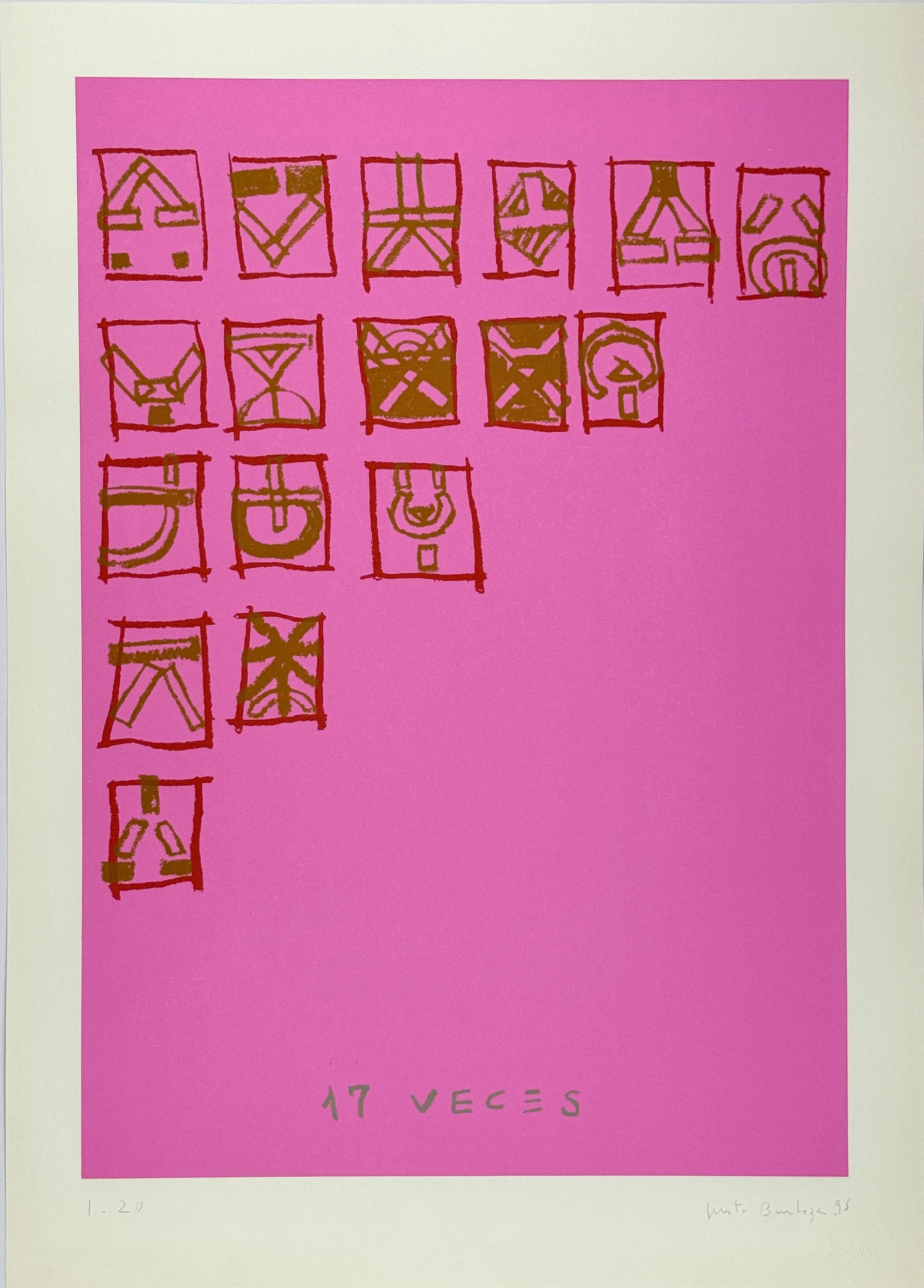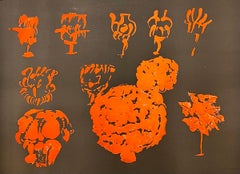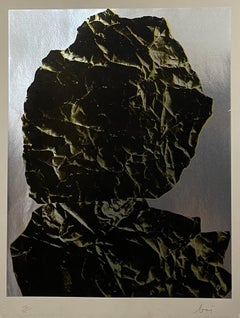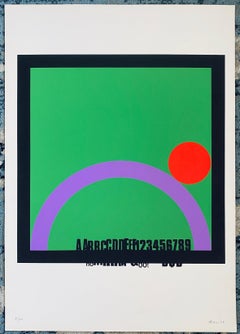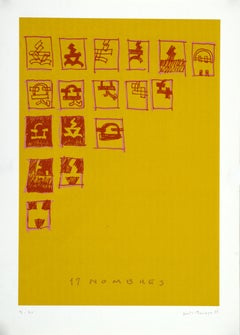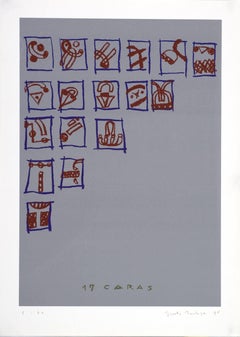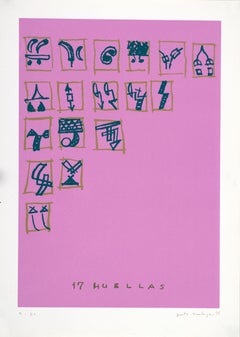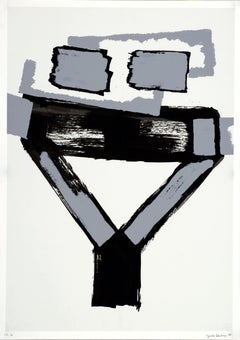Items Similar to Argentine Italian Contemporary Ink jet print mounted on polystyrene
Want more images or videos?
Request additional images or videos from the seller
1 of 10
Fabian MarcaccioArgentine Italian Contemporary Ink jet print mounted on polystyrene1989-1999
1989-1999
$2,800
£2,119.48
€2,431.05
CA$3,935.71
A$4,331.21
CHF 2,271.23
MX$52,563.25
NOK 28,390.07
SEK 26,877.53
DKK 18,149.02
About the Item
Fabian Marcaccio
560 Conjectures for a New Paint Management 1989-99
Ink jet print mounted on polystyrene with laminate
Dimensions composition 30 1/4 x 23 3/16" (76.9 x 58.9 cm) sheet 30 1/4 x 23 3/16" (76 x 58.9 cm)
Publisher Muse X Editions, Los Angeles
Ink jet print mounted on polystyrene with laminate
Fabian Marcaccio (Born 1963 Rosario, Argentina) is an
Argentine-Italian born artist living and working in the United States
whose trans-genre works including "Paintants" and '"Draftants" have
been exhibited worldwide.
Marcaccio was born to a native Argentine mother and Italian father in
Rosario de Santa Fe where he later attended the University of
Philosophy. In 1985, at age 22, he moved to New York City, where he
continues to live and work. He has exhibited widely throughout
theUnited States, Europe and South America. In 2004, Kunstmuseum
Liechtenstein organized a retrospective of his work, the same year
that a solo exhibition was mounted at the Miami Art Museum. He
regularly exhibits with galleries in New York, Los Angeles, Berlin,
Paris, Cologne and Barcelona. He has participated in numerous group
exhibitions, including; the 44th Biennial Exhibition of Contemporary
American Painting, Corcoran Gallery of Art, Washington, DC in 1995,
Summer Projects at PS1 Contemporary Art Center, New York in 2002, and
Documenta 11, Kassel, Germany in 2002. His multidisciplinary
collaborations include projects with the architect Greg Lynn that
resulted in an exhibition at the Wexner Center for the Arts, Columbus,
Ohio in 2001 and projects with composer Claudio Baroni creating
animated operas and a 2005 scored, paintball performance at Weston
Hall in Toronto, Canada.
Marcaccio’s work investigates whether the traditional medium of
painting can survive in the digital age. He has used printmaking
transfer techniques to make paintings and became well known in the
1990s for his manipulations of the conventions of painting. More
recently, he has relied upon digital and industrial techniques to
infuse his painting process with spatial and temporal concerns. The
results are environmental paintings, animations, and “Paintants” that
combine digitally manipulated imagery, sculptural form, and three
dimensionally painted surfaces.
On September 10, 2011 Marcaccio received the "Bernhard Heiliger Award
for Sculpture 2011" from the Mayor of Berlin, Klaus Wowereit.
Bernhard Heiliger Award for Sculpture.
Radical Shift: Political and Social Upheaval in Argentinean Art since the 1960s
“Fabian Marcaccio” Interview by Shirley Kaneda BOMB 41/Fall 1992
2011
Pinta London, Featured Artist, Galerie Thomas Schulte, London, England
“Corpse: Variant Paintants” Galerie Schmidt MacZollek, Cologne, Germany
Bernhard Heiliger Award for Sculpture Exhibition, George Kolbe Museum,
Berlin, Germany
2010
“Megan: Variant Paintants” Galeria Joan Prats, Barcelona, Spain
SAPS, Sala Arte Publico Sigueiros, Mexico
2009
“Analytical Rage-Paintants” Galerie Thomas Schulte, Germany
2008
“Draftants,” Galerie Schmidt Maczollek, Koln, Germany
2007
BravinLee programs, New York City, NY, USA
Ruth Benzacar, Galeria de Arte, Buenos Aires, Argentina
Fabian Marcaccio, Galeria Joan Prats, Barcelona, Spain
2006
“Especial,” Galerie Maczollek, Cologne, Germany
“Private Contractor and New Paintants,” Kevin Bruk Gallery, Miami, FL, USA
SELECTED COLLECTIONS
Whitney Museum of American Art, New York, NY
MOMA, Museum of Modern Art New York, NY
Margulies Collection, New York, NY
Collezione Maramotti, Reggio Emilia, Italy
Proje4L/Elgiz Museum of Contemporary Art, Istanbul, Turkey
MIT List Visual Arts Center, Cambridge, MA
MAM – Miami Art Museum, Miami, FL
Philadelphia Museum of Art, Philadelphia, PA
Museum für Moderne Kunst (MMK), Frankfurt/Main, Germany
Museo de Arte Moderno, Buenos Aires, Argentina
Fondacion La Caixa, Barcelona, Spain
His three-dimensional paintings are included in the permanent collections of The Museum of Modern Art and the Whitney Museum of Art, both in New York, and in the Philadelphia Museum of Art. His work has been featured in exhibitions at the MoMA P.S.1 in Queens, the Daros Foundation in Rio de Janeiro, and the Havana Biennial, among others. Marcaccio lives and works in New York, NY.
Muse X Editions. An (now defunct) LA based innovative publisher of limited-edition prints, Muse X has launched its first group of prints and is just beginning to make itself known to artists, curators, dealers and collectors. Among works just off the press are otherworldly landscapes by Barbara Kasten and Oliver Wasow, a sizzling sunset by Peter Alexander, abstract compositions by Pauline Stella Sanchez and Jennifer Steinkamp, text and photo combinations by Bill Barminski and Nancy Dwyer, and conceptual photographs by Kevin Hanley. Doug Aitken, Polly Apfelbaum, David Levinthal, Richard Long, Christian Marclay, Alyson Shotz, Uta Barth all have published with them.
- Creator:Fabian Marcaccio (1963)
- Creation Year:1989-1999
- Dimensions:Height: 30.25 in (76.84 cm)Width: 23.188 in (58.9 cm)
- Medium:
- Period:
- Condition:
- Gallery Location:Surfside, FL
- Reference Number:1stDibs: LU38210984212
About the Seller
4.9
Platinum Seller
Premium sellers with a 4.7+ rating and 24-hour response times
Established in 1995
1stDibs seller since 2014
1,810 sales on 1stDibs
Typical response time: 1 hour
- ShippingRetrieving quote...Shipping from: Surfside, FL
- Return Policy
Authenticity Guarantee
In the unlikely event there’s an issue with an item’s authenticity, contact us within 1 year for a full refund. DetailsMoney-Back Guarantee
If your item is not as described, is damaged in transit, or does not arrive, contact us within 7 days for a full refund. Details24-Hour Cancellation
You have a 24-hour grace period in which to reconsider your purchase, with no questions asked.Vetted Professional Sellers
Our world-class sellers must adhere to strict standards for service and quality, maintaining the integrity of our listings.Price-Match Guarantee
If you find that a seller listed the same item for a lower price elsewhere, we’ll match it.Trusted Global Delivery
Our best-in-class carrier network provides specialized shipping options worldwide, including custom delivery.More From This Seller
View AllPietro Consagra Italian Mod Abstract Expressionist Forma Art Informel Lithograph
By Pietro Consagra
Located in Surfside, FL
Pietro Consagra (Italian, 1920-2005).
Hand signed in pencil and numbered limited edition color lithograph on Magnani paper.
Embossed stamp with limited edition numbers in pencil to lower left, and having artist pencil signature to lower right.
(from a limited edition of 80 with 15 artist's proofs)
Published by Stamperia 2RC, Rome Italy and Marlborough Gallery, Rome, Italy.
Abstract Modernist work in colors, produced in the style of the Forma art movement of Postwar Italy, of which the artist was a prominent member.
Pietro Consagra (1920 – 2005) was an Italian Post war artist working in painting, printmaking and sculpture. In 1947 he was among the founding members of the Forma 1 group of artists, proponents of structured abstraction. (similar to the Art Informel and Art Brut in France and the Brutalist artists)
Consagra was born on 6 October 1920 in Mazara del Vallo, in the province of Trapani in south-western Sicily, to Luigi Consagra and Maria Lentini. From 1931 he enrolled in a trade school for sailors, studying first to become a mechanic, and later to become a captain. In 1938 he moved to Palermo, where he enrolled in the liceo artistico; despite an attack of tuberculosis, he graduated in 1941, and in the same year signed up at the Accademia di Belle Arti, where he studied sculpture under Archimede Campini. After the Invasion of Sicily and the Allied occupation of Palermo in 1943, Consagra found work as a caricaturist for the American Red Cross club of the city; he also joined the Italian Communist Party. Early in 1944, armed with a letter of introduction from an American officer, he travelled to Rome. There he came into contact with the Sicilian artist Concetto Maugeri, and through him with Renato Guttuso, who was also Sicilian and who introduced him to the intellectual life of the city and to other postwar artists such as Leoncillo Leonardi, Mario Mafai and Giulio Turcato. Consagra signed up at the Accademia di Belle Arti di Roma in September 1944 and studied sculpture there under Michele Guerrisi, but left before completing his diploma.
In 1947, with Carla Accardi, Ugo Attardi, Piero Dorazio, Mino Guerrini, Achille Perilli, Antonio Sanfilippo and Giulio Turcato, Consagra started the artist's group Forma 1, which advocated both Marxism and structured abstraction.
Steadily Consagra's work began to find an audience. Working primarily in metal, and later in marble and wood, his thin, roughly carved reliefs, began to be collected by Peggy Guggenheim and other important patrons of the arts. He showed at the Venice Biennale eleven times between 1950 and 1993, and in 1960 won the sculpture prize at the exhibition. During the 1960s he was associated with the Continuità group, an offshoot of Forma I, and in 1967 taught at the School of Arts in Minneapolis. Large commissions allowed him to begin working on a more monumental scale, and works of his were installed in the courtyard of the Foreign Ministry in Rome and in the European Parliament, Strasbourg. His work is found in the collections of The Tate Gallery, London, in Museo Cantonale d'Arte of Lugano and the Museum of Modern Art, Paris, and the National Gallery of Art in Washington, D.C..
Consagra returned to Sicily where he sculpted a number of significant works during the 1980s. With Senator Ludovico Corrao, he helped created an open-air museum in the new town of Gibellina, after the older town had been destroyed in the earthquake of 1968. Consagra designed the gates to the town's entrance, the building named "Meeting" and the gates to the cemetery, where he was later buried.
In 1952 Consagra published La necessità della scultura ("the need for sculpture"), a response to the essay La scultura lingua morta ("sculpture, a dead language"), published in 1945 by Arturo Martini. Other works include L'agguato c'è ("the snare exists", 1960), and La città frontale ("the frontal city", 1969). His autobiography, Vita Mia, was published by Feltrinelli in 1980. In 1989 a substantial retrospective exhibition of work by Consagra was shown at the Galleria Nazionale d'Arte Moderna in Rome; in 1993 a permanent exhibition of his work was installed there. In 1991 his work was shown in the Hermitage Museum in St. Petersburg. In 2002 the Galerie der Stadt Stuttgart opened a permanent exhibition of his work. He was one of ten artists invited by Giovanni Carandente, along with David Smith, Alexander Calder, Arnaldo Pomodoro, Lynn Chadwick, and Beverly Pepper, to fabricate works in Italsider factories in Italy for an outdoor exhibition, "Sculture nella città", held in Spoleto during the summer of 1962. He was included in the The 1962 International Prize for Sculpture the jury included Argan, Romero Brest and James Johnson Sweeney the former director of the Solomon R. Guggenheim Museum in New York. The participants included Louise Nevelson and John Chamberlain for the United States; Lygia Clark for Brazil; Pietro Consagra, Lucio Fontana, Nino Franchina, and Gió Pomodoro for Italy; Pablo Serrano for Spain; and Eduardo Paolozzi, William Turnbull, and Kenneth Armitage for England. Gyula Kosice, Noemí Gerstein, Julio Gero, Naum Knop...
Category
1960s Abstract Expressionist Abstract Prints
Materials
Lithograph
"Untitled"
By Dan Reisinger
Located in Surfside, FL
Reisinger was born in Kanjiža, Serbia, into a family of painters and decorators active in Austria-Hungary and the Balkans. Most family members died in the Holocaust, including his father. As a teenager, he became active in the Partisan Pioneer Brigade and, with his mother and stepfather, immigrated to Israel in 1949. Reisinger initially lived in a transit camp and then worked as a house painter in order to earn money from almost any source. In 1950 at age 16, he was accepted as a student—its youngest up to the time—at the Bezalel Academy of Art and Design in Jerusalem, there to 1954.
During mandatory service in the Israeli Air Force from 1954, he was the art director of its books and other publications. While there, he attended a class on postage-stamp design taught by Abram Games, who became his mentor and friend. Subsequently, he traveled, studied, and worked in Europe: from 1957 in Brussels and then onto London where, 1964–66, studied stage and three-dimensional design at the Central School of Art and Design, designed posters for Britain's Royal Mail, and worked for other clients while making intermittent visits to Israel. Then in 1966, he returned permanently to Israel and established a studio in Tel Aviv and today in Giv'atayim.
His work has been included in numerous international group and one-person exhibitions. A large number of social-, political-, and cultural-theme posters and other graphic design, such as calendars, packaging, and more than 150 logos are superior to much of his fine art. He designed a new logo for El Al airlines (1972), and the 50-meter-long aluminum-cast relief (1978) of a biblical quotation in Hebrew on the exterior of the Yad Vashem, Israel's official museum/memorial to Holocaust victims, in Jerusalem. He has also designed logos for the Tel Aviv Museum of Arts, Tefen Museum of Arts, and Habima Theater (הבימה - התיאטרון הלאומי) and the symbol and posters of the 9th-15th Maccabiah Games (מַכַּבִּיָּה).
His widely published self-produced “Again?” poster (1993) features a Nazi swastika (which Reisinger incorrectly made to face left) breaks apart to 5 pointed red Star of soviet union in reference to the possible dreaded repeat of the Holocaust. The influences on his work—itself more widely focused than solely on social and political issues—have come from colorists, Minimalists, Constructivists, and humorists. He claims one of his more significant contributions has been to stretch the visual and communicative possibilities of Hebrew letters through his symbols and logos. Reisinger is one of Israel's most-accomplished graphic designers; the others include Franz Kraus...
Category
20th Century Contemporary Abstract Prints
Materials
Screen
Italian Surrealist Pop Art Serigraph Enrico Baj Pop Art Silkscreen Foil Print
By Enrico Baj
Located in Surfside, FL
Enrico Baj (1924-2003) Italian, limited edition print.
Hand signed and numbered Signature on the corner. Edition 44 of 45. metallic silver aluminum.
Baj was an Italian artist best k...
Category
1970s Surrealist Figurative Prints
Materials
Foil
Italian Artist Modern Silkscreen Eugenio Carmi
By Eugenio Carmi
Located in Surfside, FL
Eugenio Carmi is an Italian painter born in 1920 in Genoa. He studied in Turin in Felice Casorati’s studio. His experience as a graphic designer in the ‘50s, is decisive for his pict...
Category
1980s Modern Abstract Prints
Materials
Screen
Conceptual Artist Allen Ruppersberg Hand Printed Lithograph Prints & Photographs
By Allen Ruppersberg
Located in Surfside, FL
Allen Ruppersberg (American, 1944-)
Lithograph, Mixed media
From the Top Ten Historical Similarities (and Differences) Between Prints and Photographs.
This sale is of one print not t...
Category
2010s Conceptual Abstract Photography
Materials
Mixed Media, Lithograph
"Untitled"
By Tom Baldwin
Located in Surfside, FL
Recently graduated from Pasadena’s legendary Art Center College of Design, Tom Baldwin created the series of inkjet prints Japanese Gardens in 1996 on his computer, using then-nascent graphics technology to "paint" his images on the computer screen. Baldwin embraced this technology and its accompanying printing process not just for the speed and ease of their use, but because the artist could achieve the absolute flatness that the principles of modernism preached but ultimately--because of the limitations of their tools--never reached. These colorful, semi-abstracted views of Japanese temple landscapes subtly, but radically redefine picture space. Baldwin shifts fore and backgrounds, giving equal weight to skies and hillsides. Endowing a lowly bush with a vibrant purple or orange might cause it to pop out of proportion, but ultimately lends balance and stability to the work itself, in short, returning the composition to its original, harmonious whole in keeping with the subject matter. these original prints employ a color scheme that seems more reminiscent of 1980s Japanese pop art beer advertisements...
Category
20th Century Abstract Prints
Materials
Screen
$1,100
You May Also Like
Argentinean signed limited edition original art print silkscreen 27x19 in. n8
Located in Miami, FL
Justo Barboza (Argentina, 1938)
'17 nombres', 1995
silkscreen on paper Guarro Geler
27.6 x 19.7 in. (70 x 50 cm.)
Edition of 20
Unframed
ID: BAR1437-008-025
Hand-signed by author
Category
20th Century Contemporary Abstract Prints
Materials
Screen
Argentinean signed original limited edition art print silkscreen 27x19 in. n10
Located in Miami, FL
Justo Barboza (Argentina, 1938)
'17 caras', 1995
silkscreen on paper Guarro Geler
27.6 x 19.7 in. (70 x 50 cm.)
Edition of 20
Unframed
ID: BAR1437-010-025
Hand-signed by author
Category
20th Century Contemporary Prints and Multiples
Materials
Screen
Argentinean signed limited edition original art print silkscreen 27x19 in. n9
Located in Miami, FL
Justo Barboza (Argentina, 1938)
'17 huellas', 1995
silkscreen on paper Guarro Geler
27.6 x 19.7 in. (70 x 50 cm.)
Edition of 20
Unframed
ID: BAR1437-009-025
Hand-signed by author
Category
20th Century Contemporary Prints and Multiples
Materials
Paper, Engraving, Screen
Argentinean signed limited edition original art print silkscreen 27x19 in. n14
Located in Miami, FL
Justo Barboza (Argentina, 1938)
'Sin título II', 1998
silkscreen on paper Guarro Geler
27.6 x 19.7 in. (70 x 50 cm.)
Edition of 30
Unframed
ID: BAR1437-014-030
Hand-signed by author
Category
20th Century Abstract Prints and Multiples
Materials
Paper, Engraving, Screen
Argentinean signed limited edition original art print silkscreen 27x19 in. n11
Located in Miami, FL
Justo Barboza (Argentina, 1938)
'17 trazos', 1995
silkscreen on paper Guarro Geler
27.6 x 19.7 in. (70 x 50 cm.)
Edition of 20
Unframed
ID: BAR1437-011-025
Hand-signed by author
Category
20th Century Contemporary Prints and Multiples
Materials
Screen
Argentinean signed limited edition original art print silkscreen 27x19 in. n12
Located in Miami, FL
Justo Barboza (Argentina, 1938)
'17 veces', 1995
silkscreen on paper Guarro Geler
27.6 x 19.7 in. (70 x 50 cm.)
Edition of 20
Unframed
ID: BAR1437-012
Hand-signed by author
Category
20th Century Contemporary Prints and Multiples
Materials
Screen
More Ways To Browse
Vintage Italy Print
Rosario Vintage
George Kolbe
Erik Bulatov
Exhibition Poster 1983
Giuseppe Capogrossi
Indian Miniature Painting On Ivory
Joan Miro Ubu
Jyoti Bhatt
Leo Castelli Lithograph
Long Art Work
Miro Ubu
Rothko Prints
Rubber Stamp Portfolio
Alain Le Yaouanc
Calder Exhibition Poster
Cherokee Art
Damien Hirst Signed Print
